The work has begun and so far things are looking excellent. The class has completed measuring the depth of Francis Short Pond, with the final stage in this part of our experiment to figure out the area of the little island and remove those dimensions from our final area figures. Next week we hope to make our to scale model out of clay.
**Measuring the Pond! **
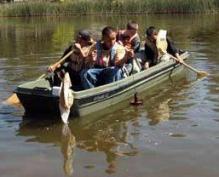 The boys working hard during the measurement process.
The boys working hard during the measurement process.
Uriel, Kris, Zach and Ivan working as a team in measuring the depth of our backyard ecosystem! We have also been tracking the: pH, Dissolved O2, Nitrates, Phosphates, turbidity and temperature twice weekly. We are hoping to track this data for a month and see what changes occur as we move further into the fall season. As the night temperatures move closer and closer to freezing we have made a few hypotheses as to the changes we expect to see occur in our local aquatic ecosystem.
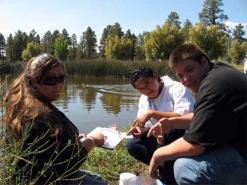 New Start Middle SChool students water testing. We will test twice a week and then graph our results as the pond moves into the winter season.
New Start Middle SChool students water testing. We will test twice a week and then graph our results as the pond moves into the winter season.
WATER TESTING!
We had many discussion about the dog in the background and the role it played in the condition of our water!
Tomorrow we start designing the first of our scientific equipment. With the guidance of Pat Kelley from Rhode Island we have some guidelines on developing our sediment trap. Right now a bit of a stumbling block is in making a brine type solution to capture the sediments that is more viscous than the contents of the pond. We are also concerned about leaving the trap deployed for 24 hours as we are an urban setting and have some worries about theft.
**Francis Short Pond Sediment Trap Construction. **
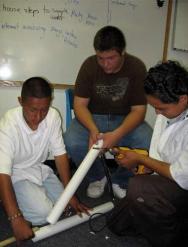 Ricky, Uriel, and Jesus are problem solving how to use PVC pipe to collect sediment samples.
Ricky, Uriel, and Jesus are problem solving how to use PVC pipe to collect sediment samples.
Uriel, Ricky and Jesus working on preparing PVC pipe for deployment in the pond!
Today Ivan problem solved some suggestions for flotation, tomorrow we will look at the ability to make this floating trap stationary.
There has been a lot of discussion in class as to how our studies of a local aquatic ecosystem are important, and how this work in any way can relate to the study of the Earth's poles. If you would like to add some suggestions, we would love to hear them.
**Transporation to the pond is no challenge for these middle school students. team work and hard work pays off! **
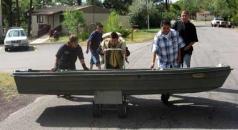 Our school is about a 1/4 of a mile from the pond, thank goddness for strong backs and a hand cart!
Our school is about a 1/4 of a mile from the pond, thank goddness for strong backs and a hand cart!
From 7000' Jillian's Class!
All Work and no play makes for a boring day!
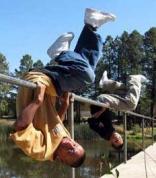 All work and no play, is well...BORING!
All work and no play, is well...BORING!
